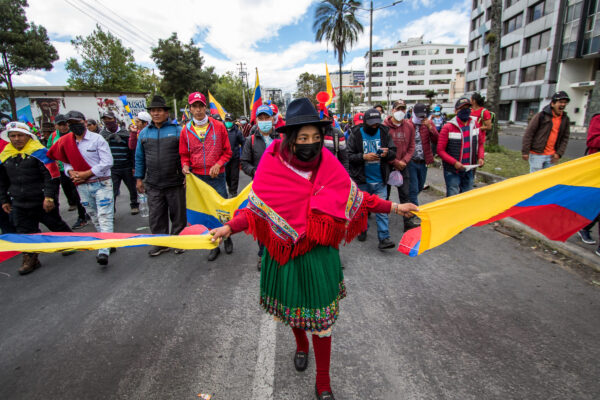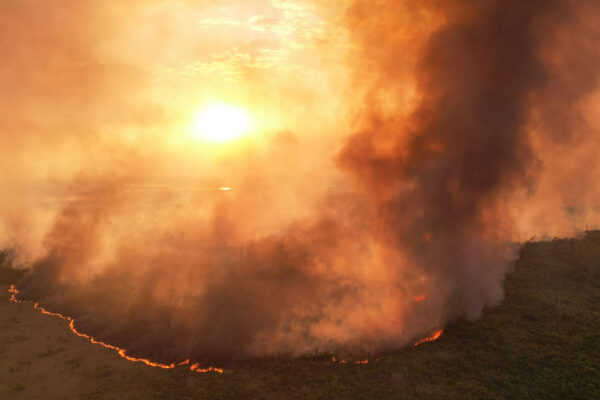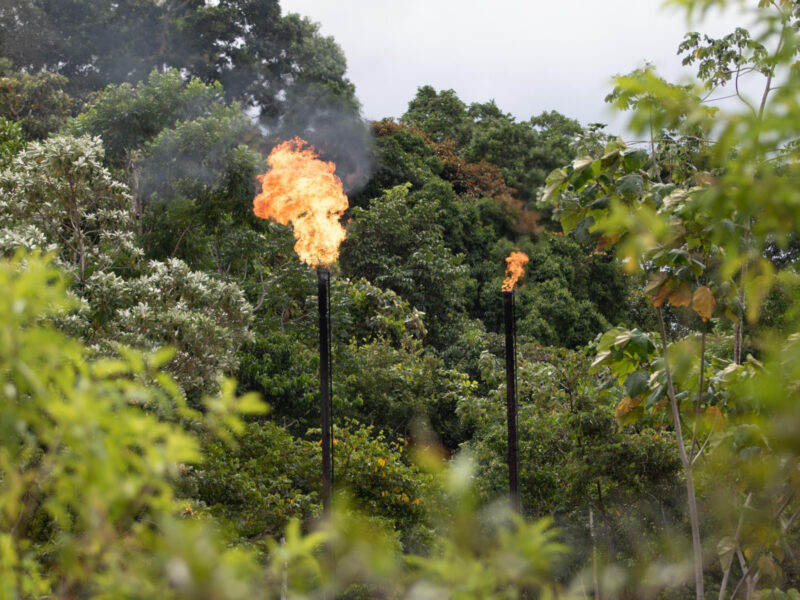Last week, the notorious North Peruvian Pipeline leaked at least 6,000 liters of oil, directly threatening the lives and livelihoods of the Indigenous Quechua and Achuar peoples of the north Peruvian Amazon. The pipeline – which spans hundreds of kilometers across seven Indigenous territories – is one of the country’s largest sources of toxic oil contamination since its construction 50 years ago. Petroperú, the state-run company that operates the pipeline, has a long track record of environmental fines and inadequate land remediation.
After more than a week of active leaking into Indigenous territories, Petroperú has still not been able to contain the oil spill, let alone remediate the extensive damages caused. Hundreds of Indigenous people are directly affected, with the number of impacted frontline communities rising alarmingly from three to seventeen in a span of just a few days. On October 7, the Achuar Nation reported that the spill reached one of their communities in the Pastaza River basin, directly poisoning Siwin Lake, which serves as their primary source of food and water. This has generated significant concerns on the ground, as the contamination risks the well-being and lives of community members, according to a public statement from the Achuar.
Amazon Watch amplifies the Achuar’s calls to hold Petroperú accountable and immediately begin the environmental remediation process while supporting community organizing and emergency assemblies through our Amazon Defenders Fund.
The spill is the cause of an unfolding humanitarian emergency that must be addressed immediately. When oil touches the Amazon’s rivers, it decimates local water and food supplies, threatening the food sovereignty of Indigenous communities. While environmental remediation of the contaminated areas is essential, the process may take decades to restore the natural ecosystem – if ever – underscoring the importance of phasing out oil in the Amazon as a long-term solution to protect Indigenous Amazonian communities.
The Achuar nation has long called for the halt of oil operations in their territories, and they have successfully campaigned against the financiers backing major polluters, such as Petroperú.
Just this last April, Indigenous leaders including the Achuar confronted U.S. banks Citi and JPMorgan Chase on Wall Street for their support of the company. As revealed by Amazon Watch’s recent report, Assessing Petroperú’s Financial, Legal, Environmental, and Social Risks, the company is heavily indebted to banks, some of which are named as the biggest financiers and enablers of the fossil fuel industry since the 2016 Paris Agreement. This support poses a direct threat to Indigenous communities and our climate at large.
Petroperú and its lenders at a crossroads
The new oil spill comes at a time when Petroperú finds itself at a crossroads. The looming threat of bankruptcy has led decisionmakers to propose restructuring plans that might further evade accountability and undermine Indigenous sovereignty in the region. Petroperú’s deepening financial crisis could drive increased oil production in order to generate the revenue required to pay its debt accumulated from its costly Talara Refinery modernization project, which has a projected cost of $6.5 billion.
Amid these restructuring discussions, Oliver Stark, the company’s former president of Petroperú, suggested temporarily transferring full management of the pipeline to the Ministry of Energy and Mines (MINEM) until security and budgetary issues are resolved in a recent interview with Peruvian news outlet, Gestión. Petroperú’s public restructuring plan also states that through MINEM, it intends to implement actions to “safeguard” the pipeline, alluding to support from the Peruvian National Police and armed forces to conduct such activities.
This proposal would transfer the pipeline’s financial and safety responsibility from Petroperú directly to government entities in an attempt to quickly resume the transportation of crude oil from the Amazon fields to feed the Talara refinery in an attempt to become solvent. As such, Petroperú and the Peruvian government have upheld the pipeline as a “critical asset” of the nation deemed as necessary for Perú’s energy security, and it has simultaneously pinned the blame of the oil spills on Indigenous peoples, claiming that spills from the North Peruvian Pipeline are mainly attributed to “sabotage” and “terrorist attacks.”
Indigenous nations warn that the proposal could be used as a tactic to evade payment of millions of dollars worth of unfulfilled reparations and environmental remediation liabilities. This potential transfer of responsibility may also be used to justify the prevention of pipeline “outages,” which the company attributes as the main cause of oil spills. However, a recently published report produced by Peruvian Civil Society Group, with support of Amazon Watch and other international allies, entitled The Shadow of Oil III, reveals data that challenges this claim. The report cited a 2017 Congressional report that found that in 2017, over 65.4% of the oil spills that occurred in the Peruvian Amazon oil fields and the North Peruvian Pipeline were the result of pipeline corrosion and operational failures. As the report warns, the weaponization of “sabotage” could be used to conceal future company errors or non-compliance.
The other debt: a history of oil spills and Indigenous rights violations
Another, more important debt of the oil industry is getting lost in the discussion on how to save Petroperú. The latest oil spill is just one more episode of a long history of damages that the North Peruvian Pipeline and the broader oil circuit have inflicted upon the livelihoods and rights of Indigenous peoples, which have been extensively documented in a recent report elaborated for the seven northern Amazonian Indigenous nations and Amazon Watch. The report clearly shows that in more than five decades, neither the Peruvian government nor Petroperú have developed the regulatory, legal, or technical capacities to repair the structural violence imposed on Indigenous nations.
The Achuar, Quechua, Wampís, Chapra and hundreds of other Indigenous nations have been fighting relentlessly for accountability from fossil fuel companies like Petroperú for countless oil spills and contamination that have inflicted irreversible damage to generations of peoples and resource-rich environments necessary for climate regulation amid increasing climate catastrophes worldwide. Together with these Indigenous organizations, Amazon Watch and other allies have repeatedly denounced Petroperú’s responsibility for undermining rights and contamination related to its North Peruvian Pipeline.
One of the best things the rest of us can do to help is to also scrutinize the role of the “international financial community” and prestigious commercial banks for aiding this industry, despite dozens of climate promises and their failure to demand fossil fuel expansionist companies like Petroperú to take real transition measures.
In solidarity with the Indigenous nations of the Peruvian Amazon, we call on international lenders and investors to accept accountability and take bold action to stop this destruction of Indigenous peoples, the Amazonian Basin, and our climate.














